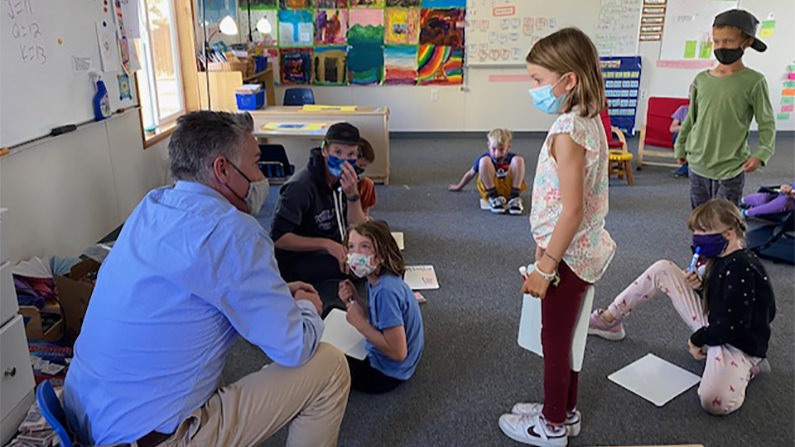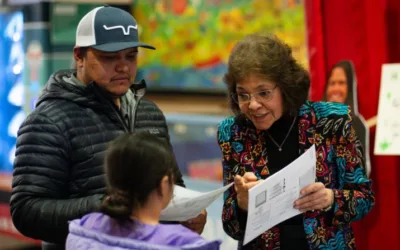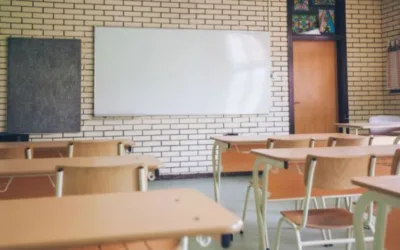Teton Science Schools made headlines last spring for a wave of resignations that saw more than a third of staff leave their jobs. That was right around the time Shawn Kelly joined TSS as the interim head of the K-12 Mountain Academy. As of September, Kelly is also now Teton Science Schools’ new CEO. KHOL News Director Kyle Mackie interviewed Kelly about taking the helm during what he describes as a “perfect storm.”
The following interview transcript and audio has been edited for clarity and brevity.
KYLE MACKIE: Shawn Kelly, thank you so much for joining us at KHOL.
SHAWN KELLY: Yeah, thanks for having me.
MACKIE: Our pleasure. We appreciate you taking the time. I’d like to start by asking you to introduce yourself. Can you tell us about your educational background and what led you to Jackson and taking this position with Teton Science Schools?
KELLY: That’s a very big question, and I will attempt to give the Reader’s Digest version of that. Interestingly enough, I did not like school as a student, as a young student, and even up through college. I was not a big fan of school. I was actually bored most of the time and really frustrated and frankly skipped a lot of school. And at some point, somebody said to me, ‘Well, if you want to make a change, why don’t you go into education?’ And so I did, as a roundabout way. I started working right after college for USAID in a project in Sri Lanka. We were working on some coral reef preservation and a shrimp fishery. But while I was there, I got to lecture at a number of international schools, and that really sparked my interest around being able to take my fascination for natural resources and to sort of leverage it into teaching students about the importance of it.
So, long story short, I came back, I went to Harvard for graduate school, the ed school, and got my degree in teaching and learning. And since then I have been working, I worked for a year in a public school and in East Coast boarding schools and have held pretty much every job you can possibly imagine in schools, from teacher/coach to dorm head, to academic dean to director of development and then head of school at two different independent schools. I stepped away from education after 27 years to do some other work and did some consulting work. And about six or seven or eight months ago I just found I missed schools and I told my wife that I wanted to get back in the schools and she kind of rolled her eyes and said, ‘As long as you look at schools that you would want to send our kids to.’ And I said, ‘Okay.’ So, I looked at Mountain Academy and saw the interim position and I wasn’t sure about it. But I came up and it was pretty clear that it was a school that I really resonated with my educational philosophy. And as I talked to my daughter about it, she’s eight years old, her name is Eva and she goes to Mountain Academy, but she was really excited by it. Because she had had a couple of bad years at school and I could just see her confidence dropping. And what’s been really exciting for me is after the first two weeks of school, I could see I got my old kid back. You know, Eva’s back to being her sort of bubbly, happy self who loves school. And that’s the kind of school that I want to be a part of. And that’s why I chose to come to Mountain Academy. And then through getting to know the organization a little bit better, it was, you know, the overall mission of TSS and what TSS is currently doing and wants to accomplish is, it’s pretty impressive stuff and it’s exciting to be part of that. And that’s kind of what draw me here was to be able to be part of that.
MACKIE: Okay, so it’s been a tumultuous year in education across the board, but specifically at Teton Science Schools as well. And I’d be remiss if I didn’t ask you about joining the organization during what was a really difficult time for the organization. There was really this crisis in leadership and good faith among employees. I read in the [Jackson Hole] News&Guide that I think about one third of the school’s employees left their jobs last year, including many in leadership. And there were allegations of toxic leadership and a culture of gender bias in the school. So, you came in at a difficult moment—
KELLY: It was a challenging time, yes.
MACKIE: Why join Teton Science Schools at that time? You know, why are you the right person to come into this role?
KELLY: So, as a as a side note, which I have to laugh at because it’s funny, that article in the newspaper came out my first day on the job [May 12, 2021], and the temporary housing I was in—the neighbor’s name was Steve. He comes out and he says, ‘Hey, who are you?’ And I tell him and he says, ‘Oh, interesting article in the newspaper today.’ And I didn’t know what he meant. And I went and read it and he says, ‘Welcome to Jackson.’ So, it was a funny introduction. But, you know, for me, part of my career has been, a good portion of my career has been coming into organizations, departments that are struggling. And those struggles are, you know, there’s a huge spectrum of what those struggles have been. But when I came out to interview, I’ll be honest, when I was first looking at Mountain Academy and I heard about the struggles, there was a bit of a ‘Wow, that’s a lot of challenges they’re going through.’ And what really convinced me is when I came on the interview and, you know, most of it was virtual because of COVID. And when I came on campus and I got to meet the people associated with the organization, for me, that was the real part that sealed the deal was the parents I met were unbelievably welcoming and friendly. The students, they had a sparkly factor to them. They were just sparkly kids and really interesting. And granted, I didn’t meet all the faculty, but the faculty I did meet, I was unbelievably impressed with in terms of their commitment to education and to just be better, to do better. And, you know, not every industry, and that includes education, are people particularly interested in doing better or improving their performance. And that’s been the cornerstone of my career, has always been trying to be reflective on not only myself in the organization, but the organization as a whole and trying to teach that that’s the culture you want to achieve, which is not only accept feedback, but embrace it and actually be thankful for it because it allows the individual and the organization to get bigger, to grow, to become just better.
When I met all those folks, I was—I don’t know if it’s the Irish Catholic in me, I don’t know if it’s the just the sense that I’ve been mission driven my entire life—there was a sense of ‘This organization is doing some really amazing things and it needs some help to get past this.’ What I was encouraged by is, you know, the organization did bring in an outside investigator to come in and do a pretty thorough investigation. And I’ve read that investigation. And I’ll be honest, I wasn’t there. And for me, I’m always—I don’t want to say reluctant, but if I didn’t witness it personally and I’m always, you know, take things and read it and say, but, you know, I don’t know for sure because I wasn’t there. The report that came out was pretty clear that it didn’t find any evidence to support gender bias in the organization, but it did find that there was pretty challenging communications systems for communication within the organization or the lack thereof of communication. And it’s been my experience since I’ve been here for four months is that communication was one of the major drivers of a lot of the issues at TSS as an organization, in terms of just information moving between the various programs, both up and down the organization. So, that’s something we’ve been really working on. And by no means do I think we’ve fixed it completely, but really working on getting communication to try to be a priority so that people are talking to each other and, you know, you have those problems that exist and then you throw COVID into the mix, where you sort of depersonalize people and you start to be able to create those sort of two dimensional images of people on a computer screen versus, you know, a real person that you’re sitting and talking to. So, it was a bit of a perfect storm that came about.
After the investigation, there was a committee formed called the bridge committee, and the bridge committee was made up of board members, faculty and staff from the various areas of the organization to just really start talking about what are the intrinsic strengths of the organization? But what are some of the systemic problems that we need to deal with, to fix so we don’t get this? And then out of that bridge committee, there were several working groups that came out. One is a DEI [Diversity, Equity and Inclusion] working group to really look at our institutional philosophy around DEI and two, a values working group to really talk about as an organization, what do we value? And three was, you know, a group to onboard the new CEO. So, I do see, coming in it from the outside, that the organization went through some some—it was a thing. They really went through this thing but then took it really seriously to, ‘How do we move forward and make sure that this stuff doesn’t happen again?’
MACKIE: I believe that there was some hope expressed by some employees in the search for a new CEO that they might choose a woman to lead the organization or a local who had deep ties to the community here. I wonder if those are factors that you considered when you were weighing whether or not to take this new position on?
KELLY: Yeah, you know, I think I’m a big believer that there’s pluses and minuses in everything. You know, no matter what you choose there’s pluses and minuses. And I think one of the major reasons that I was hired was not only my experience in terms of my background and ability to bring that in and leverage it for this organization but also the fact that I don’t know the organization extremely [well]. I’m not coming from the area. I’m not coming from inside the organization. So, I’m really coming at it with fresh eyes. And I think that was a pretty major concern of the organization leadership, the board, to really bring somebody in with some fresh eyes, to look at it more critically and to evaluate what are we doing, should we be doing this or are we doing as well as we can? My personal belief is that every organization needs to be constantly reviewing what it’s doing. I don’t want to say it needs to be doing it daily, but weekly, you need to be really spending some time thinking about, ‘Are we really providing what we’re saying we’re providing?’ And what are the risks, what are the threats to the organization internally and externally? And how do we make sure that the organization lasts as long as it can?
Jeff Bezos famously said in one of his letters to his, I think to the employees that, you know, ‘Amazon will fail. Our job is to push that failure as far down the road as we possibly can.’ So, there’s got to be this awareness that, you know, all organizations are at risk and we have to really be willing to be nimble and think differently. So, when that was expressed to me that that was one of the main interests for me was to bring my experience in educational organizations and then look at this place critically and say, ‘What are we doing really well?’ And by the way, there are some stuff we’re doing—there’s a lot of stuff we’re doing really well. What’s the stuff we need to work on? And let’s fix that. And that’s the stuff that excites me, to be honest, is being able to take an organization that is maybe not maximizing what it’s doing and then create systems and programs and putting the right people in positions to get it to a point where it can really be firing on all cylinders and be amazing stuff. And TSS, I mean, let’s be clear, TSS—a lot of organizations, schools will say that they’re unique and they’re not that unique. And TSS is a pretty unique organization, not only because of its location, but also because of its mission and programing and what it’s doing in the world. There’s not many schools that have a local, national and international impact on this stuff. So, that’s a pretty exciting path for me.
MACKIE: So, I read in the News&Guide that you started this position by giving everybody your cell phone number—staff, parents, whomever. How is that going?
KELLY: [Laughs] I only laugh because the day that email went out, I got a phone call at 10:30 at night and it was a parent and he says, ‘Hey, you told us to call anytime.’ And I said, ‘Well, I didn’t necessarily mean 10:30. What’s going on? It must be emergency.’ And it was an emergency. It was actually, I wouldn’t say it was a huge emergency, but it was an emergency in that it was going to have an impact on student life the next day. And for me, that was a sign of success. And what I’ve also been really pleased is that I can’t tell you how many times I’ve heard in the past couple of months, ‘Hey, I was going to send an email, but I figured I’d just call.’ And, you know, schools at their core, and I say schools, I don’t just mean Mountain Academy, I mean Teton Science Schools, it’s a school. It’s a school that operates, you know, in the field, it operates in the classroom and it operates in terms of professional development, outreach for other teachers locally and nationally and internationally. And the core relationship in schools is a personal relationship between, you know, teachers, students and parents.
And what happened, I mean, last year was a pretty perfect storm of the issues going on internally, COVID, and then the sort of transition to more communication styles that were not face-to-face, both between students and teachers, but also between faculty and leadership, parents and leadership, students to students. And for me, I’ve always worked in educational organizations where trust is built upon this relationships, the relationships that are built from the various constituents and relationships are frankly, they’re not built on Zoom. They’re built in person over time. And part of my job is that, you know, I can’t fix every problem at the organization, nor should I. There’s a pretty robust group of people working at that place. But for families and faculty and staff to know that if something comes up, just call me and I’m—I may not be the person to fix it, but I will make sure the right people are involved in the conversation to fix it. So, I’ve been excited to see more personal interactions occurring after COVID, that people are starting to get back into the groove of talking to each other, even to the point of where you’ll see somebody and say, ‘Oh my God, you’re a real person!’ And so that’s what schools need to be, is that personal relationship where people trust you. And so that’s been, that’s been challenging, but on the other hand, if we don’t have that, then the organization doesn’t work.
MACKIE: So, the school year started a couple of weeks ago. I wonder what success will look like for you this coming year in your first full year as head of Mountain Academy and also CEO?
KELLY: That’s a really good question. I’d say my number one issue that I want to address is stability in the organization. You know, I think the reason why, like I actually don’t particularly love being in charge of things, my personality is such that I actually prefer to sit back and let other people run it, but I will step in as needed because being in charge, it’s hard. I mean, it’s a hard job and it is a lot of responsibility. And I take it really seriously, because we’ve all, all of us have seen organizations that are run badly and the impact that that has on people. And I’ve often seen a lot of organizations that are run badly, not because of malice or because of ill intent, but just for a myriad of reasons. And for me, the reason I want to really work on stability is because it impacts people’s lives. You know, any organization, anywhere in the country, in the world, people are going to be picking up their families and moving to an area. And like me, you know, I’m in the process, we’re trying to sell our house down in Colorado, and that adds a certain level of stress, and move up here. So, you know, we are changing our life trajectory. And it’s not just us. It’s pretty much everybody that comes to work for an organization is changing their life trajectory a bit. And so, it’s really important that leadership does it right, because you’re literally impacting people’s lives.
So, for me, that stability issue is about getting to a point where people feel like they feel some stability in the organization and their jobs. They feel like they’re being supported. They feel like the culture and climate is one that really makes them thrive and allows them to do their job and feel really good about that. So, those are my major goals for the first year. And now, obviously, culture, climate and stability, those are sort of big topics. And there’s a lot of stuff underneath that that involves making those things happen. And that’s where we’re looking at systems, protocols, procedures, how we hire people, how we retain them, how we talk to them about, you know, professional feedback, how we engage with parents and our own communication, students. I mean, this is all stuff that we’re looking at and really looking at the organization from top to bottom to figure out how do we do better for everybody? Not just for our clients, but for internally, for our staff and faculty.
MACKIE: Speaking of staff and faculty, how is TSS doing in terms of rehiring for some of those positions that turned over last year?
KELLY: So, as you know, hiring people is—it’s really a challenge. It’s a challenge nationwide right now getting folks to get them into positions. But it’s particularly challenging in Jackson because of housing and a few other issues. But we’ve had, because of the challenges last year, obviously we had some challenges in terms of just timing because we were dealing with this these issues, you know, that also delayed some of the paths forward in terms of the process around hiring people. So, that got delayed. I’ve been remarkably happy with our ability to fill some key roles in the short term, but we do have some work to do. I mean, this is something that we are going to actively have to work towards attracting and recruiting some folks into key roles. But I also think one of the conversations that I think is going to happen is TSS needs to do, we need to figure out a process and procedure for taking internal people and giving them the leadership skills and the professional development they need to fill in to some of these roles in the future.
I really do think that because of TSS’ role in this community, it should be a career path for people who want to enter in, and we should be putting systems in place so that people can not only, you know, if they want to start teaching or just doing field ed, that’s great. But if they find themselves that they want to be in a leadership position somewhere down the road, whether it’s at TSS or somewhere else, that we’re actually putting training and professional development into our program to make sure that that’s happening. It’s good for them. It’s good for the organization. And frankly, my goal is, I want TSS to be, if you’re an educator, it’s the place to work, not only because it’s a great place to work because of what you’re doing, but it’s just a great place because the culture and climate is really good and there’s so many opportunities for you within the organization. So, I think it’s going be a combination of externally over time, trying to recruit people from outside of Jackson, but then also a combination of helping develop people internally in the organization.
MACKIE: You know, this will be my last question for today, but I’m wondering, have you gotten any feedback from students?
KELLY: I have. You know, and I mean, ultimately, that’s what it’s all about, right? I mean, the whole purpose, the mission of the organization is for the students. And I haven’t gotten to know all the students. I haven’t even gotten to know most of the students. But I’ve gotten to know a number of the students. And I can’t tell you how many times I’ve sat outside at recess or at lunchtime or pick up or drop off, and I’ve had a student say to me, ‘Well, this was really nice.’ And I was like, ‘What was really nice?’ ‘Like, that we’re talking.’ And I’m like, ‘Well, I’m sorry that that hasn’t been your experience.’ So, what’s been fun is I’ve had a number of students come up to me in the past four months wanting to give me their feedback. And I had some students that were, had a tough year last year, not because of what was going on at the organization, but just a tough year because of their own [issues]. And they’ve come in and indicated they want to talk to me because they felt that that would be a really productive use of their time. And for me, that’s the stuff that keeps me going, is to see these students who are—they’re really amazing kids. And I’m enjoying getting to know them. And I’m really looking forward to over time, getting to know all of them at the at the school and at the organization because they’re great kids. And so, the feedback so far has been, I think, very good. But of course, I think students are—if it wasn’t good, they probably wouldn’t have come in and say it to me—although they might, I’ve had a couple of kids be very direct with me. But I think the feedback’s been good so far.
MACKIE: All right. Well, good luck with those who, you know, may be your harshest critics moving forward. Shawn Kelly is the CEO of Teton Science Schools. Thank you so much for taking the time to join us today on KHOL.
KELLY: Thank you. Appreciate it.





